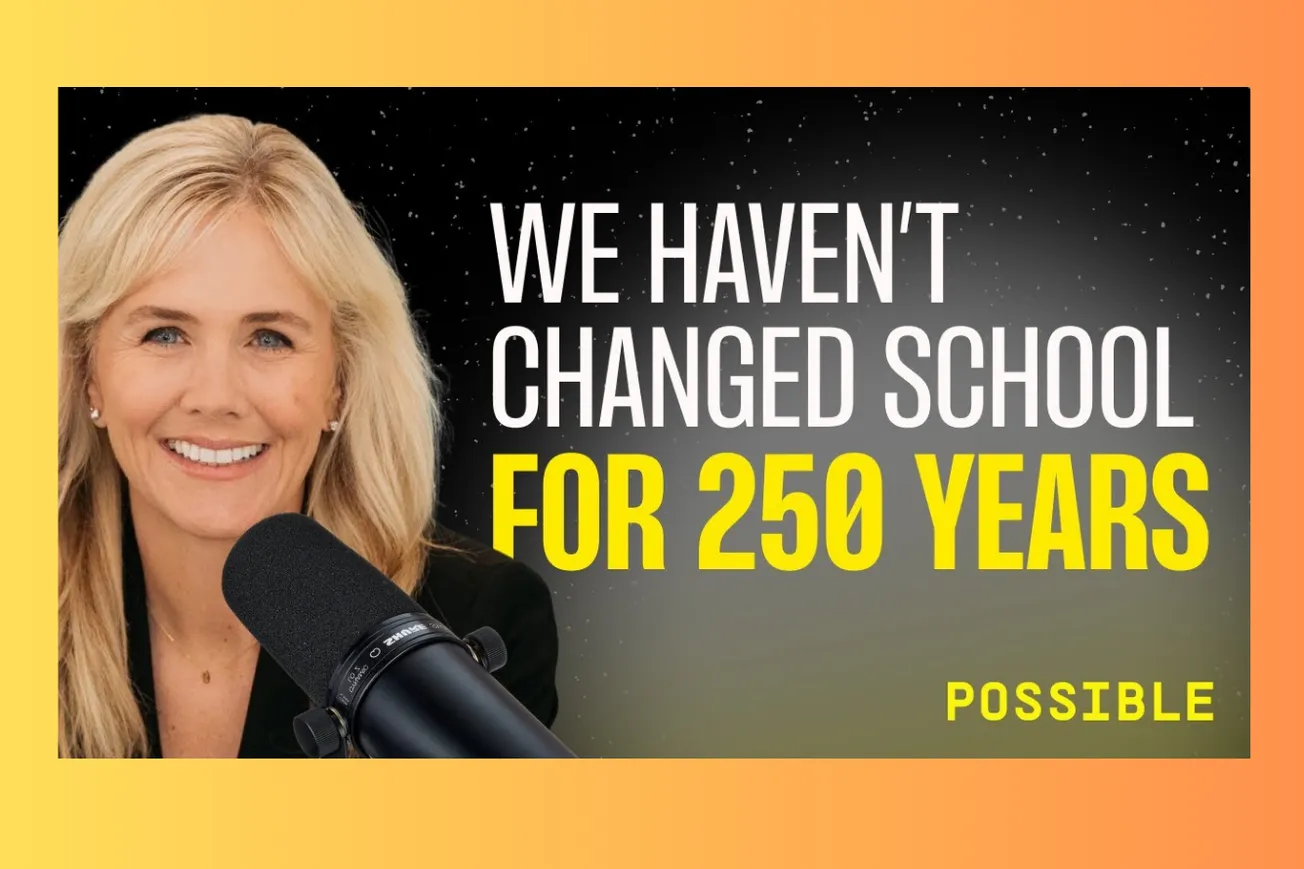Table of Contents
Students at Alpha School complete rigorous academics in just two hours daily through personalized AI tutors, then spend afternoons on entrepreneurial projects and life skills development.
Key Takeaways
- Traditional education hasn't changed in 250 years, delivering one-size-fits-all instruction that kills student curiosity and passion
- Alpha School uses AI-powered personalized learning to compress academics into two focused hours daily
- Students show 2.2x faster learning rates on average, with gifted students achieving 5-6x acceleration
- "Guides" replace traditional teachers, focusing on mentorship and emotional support rather than content delivery
- Afternoon workshops emphasize real-world skills like entrepreneurship, financial literacy, and public speaking
- Student projects include running food trucks, Airbnb businesses, and developing AI-powered mental health tools
- The model costs approximately $10,000 per student annually for AI technology alone
- Alpha School plans 12 new campuses in 2025, expanding access through educational savings accounts
The Traditional Education Crisis
American education remains trapped in an industrial revolution model designed for mass compliance rather than human flourishing. McKenzie Price, founder of Alpha School, witnessed this firsthand when her daughter declared "school is so boring" halfway through second grade.
- Traditional classrooms force students to "learn how to sit quietly" and "ask permission to go to the bathroom" for 13 years
- The average teacher gets only 22 seconds of one-on-one time with each student daily
- Students spend 6 hours daily plus 2-4 hours of homework, creating an unsustainable 12-hour commitment
- The system prioritizes compliance over curiosity, extinguishing the natural excitement five-year-olds bring to learning
- By third grade, students transition from "learning to read" to "reading to learn," creating permanent disadvantages for struggling readers
- Price describes the traditional motivation model as telling students to "be a good soldier, do what you're supposed to do, but it's not exciting"
The industrial education model served its historical purpose of educating masses and creating compliant citizens. However, it wasn't designed to unlock individual potential or foster human flourishing in an AI-driven economy.
Alpha School's Revolutionary AI Model
Alpha School reimagines education from the ground up, using AI to deliver personalized instruction that meets every student exactly where they're at academically.
- Students complete core academics (math, reading, language, science) in just 2-3 hours daily through AI-powered apps
- The platform analyzes learning speed, identifies knowledge gaps, and provides real-time coaching on study techniques
- AI tracks whether students read explanations when they get questions wrong or simply guess randomly
- One Alpha graduate described AI as "the microscope to biology" for learning science implementation
- The system accommodates students from 10th percentile to 95th percentile ability levels simultaneously
- Price emphasizes: "We don't use chat bots" - the AI operates behind the scenes as a measurement and guidance tool
The technology costs approximately $10,000 per student annually, though Price believes this will decrease as AI becomes more affordable. The platform implements 40 years of learning science research, including optimized working memory usage and spaced repetition.
Student Experience and Outcomes
Alex, a 16-year-old Alpha School senior, transitioned from a top-40 public magnet school where he spent 12 hours daily on academics and homework.
- Alpha School students show 2.2x faster learning rates on average compared to traditional schools
- Gifted and talented students at GT School achieve 5-6x acceleration rates
- Students develop "confidence anchors" - mastery in one subject that builds belief they can excel in others
- Alex's entrepreneurial project involves building "Barry," an AI-powered plush toy for teen mental health support
- Morning academics focus on practice problems, educational videos, and note-taking with AI personalization in the background
- Price notes: "When you give a kid the right level and pace of learning, they just take off like a rocket"
Students use AI tools as "superpowers" rather than shortcuts, learning prompt engineering and feedback optimization. The school explicitly teaches that "ChatGPT is a terrible writer but a fantastic feedback partner."
Transforming the Teacher Role
Alpha School eliminates traditional teaching roles, replacing them with "guides" who focus entirely on mentorship and emotional support.
- Guides earn minimum $100,000 annually, significantly above typical teacher salaries
- They conduct 30-minute one-on-one meetings weekly with each student, plus additional individual time
- No lesson planning, grading papers, or content delivery - AI handles all academic instruction
- Guides focus on understanding what makes each student tick and helping develop growth mindsets
- Price explains: "90% of what creates a great learner is having a motivated student"
- The role transforms from "bucket with holes trying to empty the ocean" to meaningful mentorship
- Traditional subject matter expertise becomes less critical than coaching and motivational skills
This model addresses the teacher shortage crisis by creating more appealing, better-compensated positions focused on human connection rather than administrative burden.
Real-World Projects and Life Skills Development
Afternoons at Alpha School emphasize practical skills through hands-on entrepreneurial projects and workshops.
- Students run actual businesses: food trucks, jewelry companies, Airbnb properties
- Financial literacy integrated through "Alpha currency" - students earn, save, invest, and donate
- A second-grader made $500 profit from a jewelry business and developed investment plans
- Projects teach cooking, grocery shopping, menu planning, marketing, and team collaboration
- Students present at assisted living facilities, bookstores, and open mic nights in New York City
- High school seniors complete four-year "Alpha X" projects focused on solving real-world problems
- Workshops include wilderness survival, firefighting, triathlons, robotics, and coding
- Price emphasizes: "Young people crave to be creators and contributors, not just consumers"
The school explicitly embraces entrepreneurship and capitalism as educational tools, using business ventures to teach everything from math skills to failure resilience.
Assessment and Personalization Technology
Alpha School leverages advanced assessment tools to create truly individualized learning experiences.
- Uses NWEA MAP assessments given to 10 million students nationally for standardization
- Dynamic assessments continue until they exhaust a student's knowledge level rather than testing grade-level mastery
- Assessment results feed directly into personalized learning plans through AI analysis
- 30 minutes of computer work provides more insight than "all year from traditional classroom"
- The system identifies specific knowledge gaps and creates targeted lessons to fill holes
- TeachTales program customizes reading content - ninth-grade level student reads age-appropriate stories
- Students create Taylor Swift-inspired songs to memorize AP Art History content
- Price describes the process as "doing a CAT scan of a child's brain" to understand knowledge gaps
Traditional schools rarely adjust instruction based on assessment results, while Alpha School makes real-time modifications to each student's learning path.
Scaling Challenges and Future Vision
Alpha School faces significant obstacles in expanding their revolutionary model to serve broader populations.
- Real estate represents the biggest scaling challenge - finding properly zoned school buildings
- Recent monastery chain partnership enabled 12 new schools opening in 2025, with 15 more planned for 2026
- Lower-cost models available for $10,000 annually, potentially $5,000 with educational savings accounts
- Public school resistance stems from fear and misunderstanding about AI replacement concerns
- Price advocates restructuring traditional school days: personalized academics until noon, then existing extracurriculars
- Market demand is strong - families "hungry for education that works" drive expansion
- Teacher recruitment succeeds because guides "crave a work world where they get paid well to positively impact students"
Price envisions transforming K-12 education nationally by combining the 10% technology advantage with 90% motivation models that engage every student.
Common Questions
Q: What makes Alpha School different from traditional online learning platforms?
A: Alpha School combines AI-powered personalization with in-person mentorship and real-world project-based learning.
Q: How do students perform on standardized assessments?
A: Alpha students show 2.2x faster learning rates on average, with gifted students achieving 5-6x acceleration.
Q: What qualifications do Alpha School guides need?
A: Guides need coaching and motivational skills rather than subject matter expertise, earning minimum $100,000 annually.
Q: How does the school handle students who struggle with motivation?
A: The school uses various incentive systems including currency, real cash rewards, and tailored motivational approaches for each student.
Q: Can this model work in public schools?
A: Price believes the model could work with proper funding and restructuring of traditional school schedules.
The AI-powered education revolution is already transforming how students learn, shifting from industrial compliance models to personalized growth experiences. Schools embracing this technology will unlock unprecedented student potential and teacher satisfaction.





